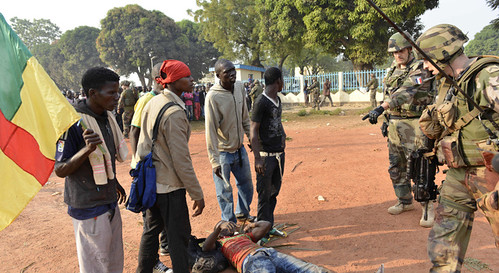
Chadian troops opened fire on demonstrators in the Central African Republic capital city of Bangui killing on person and wounding others. The Chad troops are working with France in occupying the country., a photo by Pan-African News Wire File Photos on Flickr.
Colonial Ghosts Continue to Haunt France
By ADAM NOSSITERJAN. 10, 2014
DAKAR, Senegal — In the paternalist universe of France and a dozen-odd former African colonies, its stifling embrace of the Central African Republic is unique, a century-old hug both protective and deadly.
That special relationship is playing out now as France finds itself stuck in a quagmire decades in the making — and one in which France, indirectly at least, has had a hand. The weight of a brutal colonial past and its meddling post-colonial sequel underpin Operation Sangaris, a peacekeeping mission other European countries, and the United States, are so far happy to leave to the French. And perhaps for good reason.
For the moment, the 1,600 French troops in the country have kept Muslim and Christian factions uneasily at bay and reduced violence that has killed an estimated 1,000 people and driven more than 900,000 from their homes; as many as 100,000 are camped out at the airport in the capital, Bangui, seeking the protection of French and other troops.
The feared genocide — a warning term used by French officials in Paris and at the United Nations last fall — has so far not materialized.
But genocide, real or imagined, always had less to do with the reality of a French intervention than with seeking short-term support for it. The underlying reasons have more to do with a long-term bond that has seen French troops deployed in the Central African Republic seven times in just over 30 years, including on three occasions in 1996 — to the point that some French commentators have termed the latest one merely inevitable. This time, for eight months France looked on uneasily as bodies piled up and local hostility toward the Muslim rebel rulers from the north grew.
Finally, with the large-scale killings of Dec. 5 in Bangui — perhaps precipitated, with some irony, by a scheduled United Nations vote on intervention that day, as local commentators suggested — it could wait no longer.
France cannot escape the Central African Republic, and vice versa. More than 15 years ago, a former prime minister, Jean-Paul Ngoupandé, wrote in a despairing memoir that France “needs to question itself, candidly, on its role in the infantilizing of this country.”
But long before France’s troops got into the business of making and unmaking rulers, the lands north of the Ubangi River had entered the French conscience.
What became the Central African Republic — it was then in French Equatorial Africa — played a central role in forcing the French to recognize the ugly realities of colonial rule across France’s then-vast overseas empire. The devastating travel account of the novelist and essayist André Gide, who traveled through the colony of Oubangui-Chari in 1926-27 and later was awarded a Nobel Prize, caused a scandal when it was first published as “Voyage au Congo,” and it “shocked French opinion in an era when everything was done to hide from the public the negative aspects of the colonial regime,” one of the last French administrators of Oubangui-Chari, Pierre Kalck, wrote years later.
Gide had come in search of butterflies and exotic flora and fauna; he stumbled on horrifying accounts of brutality, practiced by French colonial agents, under the thumb of French state-chartered companies exploiting rubber and other resources. Not far from Bangui, inhabitants told the writer of exemplary “punishments” inflicted for not obeying orders or failing to bring in the rubber quotient: men tied to trees and shot, women massacred with machetes, children shut up in a hut and burned alive, men forced to carry huge beams while walking in a circle for hours in broiling heat until they dropped.
“Alas, this ‘ballroom scene’ was not, I fear, exceptional in the least,” Gide wrote. “Sleep is impossible for me,” he continued. “An enormous groan now possesses me; Now I know things I feel powerless to do anything about. What demon drove me to Africa?” he wrote. “For now, I know; and I must speak out.”
In systematic and until then largely unacknowledged state-sanctioned violence, France had tied itself, for ill and good, to the country’s future. It is a troubled and unequal partnership that is still working itself out.
No comments:
Post a Comment